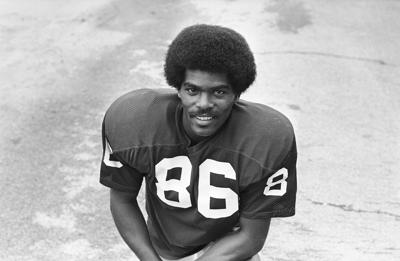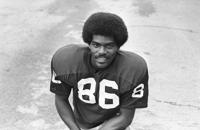Marlin Briscoe, aka "The Magician," is a name that every Coloradan should know.
Briscoe was the first African American to start at quarterback in the NFL, and he broke that color barrier right in Denver for the Broncos in 1968.
“I don’t know why God chose me to break that barrier,” Marlin told me last week after a tribute on Monday Night Football. “But I’m glad I took it upon my shoulders to let America know that a Black man could think, throw and lead on that level.”
I wanted to hear what Marlin had to say about those turbulent days of 1968 as another Broncos season starts amid a nationwide conversation about race that has been similarly turbulent.
“So many things happened that year to change the fabric of society,” Briscoe said. It was the year Martin Luther King Jr. was killed, Olympic champions John Carlos and Tommy Smith raised their fists on the podium to protest discrimination, and the Tet Offensive unhinged the Vietnam War.
“So it was kinda ironic that me breaking the color barrier at that position came in 1968.”
He sees 2020 as a long overdue coda to 1968.
“It’s a long time coming,” said the pioneering athlete of the conversation about race happening in 2020. “I just turned 75 last week, and all of those years, to endure what I’ve had to go through, the '50s, the '60s, I’ve seen a lot,” he said, the battle scars audible in his voice. “It was such a hard road to travel.”
“The recognition of what has been happening … is progress,” he added. “But we got a long ways to go.”
With all the black quarterbacks on stage now, such as Russel Wilson, Cam Newton and Teddy Bridgewater, it’s hard to remember back to a time when the league recruited black quarterbacks but always redirected them to other positions.
A 14th-round draft pick of the Broncos in 1968 out of Omaha, Briscoe refused to sign with the Broncos as a defensive back unless he was given at least a three-day tryout at quarterback during training camp.
As fate would have it, the Broncos' starting quarterback got injured early that season, and other backups didn’t rise to the occasion. So on Sept. 29, 1968, Coach Lou Saban turned to Briscoe in the fourth quarter of the home opener and told him to go in.
“I remember when I went out on the field, I was the only one that wasn’t nervous. I had played that position since I was 10 years old, since Pop Warner. I just went out there and started throwing.”
Briscoe completed his first pass for 22 yards. The next drive, he guided the Broncos 80 yards. Denver still lost, 20-17. But the world had changed.
“It went really well,” said Briscoe. “The fans were real supportive. That was one thing, society didn’t think a black quarterback would be supported by the fans or the players, or management. My entire offensive line at Denver was white players from the South who had never played with a black player. I had no problems.”
A week later, Briscoe made his first start. He wound up starting five games and playing in 11, passing for 1,589 yards with 14 touchdown throws — still a Broncos rookie record for touchdown passes. He also rushed for 308 yards and finished second in voting for AFL rookie of the year.
If only that was the end of the story.
In the offseason, Briscoe found out that he wouldn’t be playing quarterback the next season.
“Saban was a quirky guy,” Briscoe said. “I’ve always been asked, was there racism? Well first of all, he didn’t have to put me in. I never understood what his motives were not to let me play once I established myself. I have mixed emotions about the motives, one way or the other.”
If he wasn’t going to play quarterback, Briscoe wasn’t going to stick around. He was eventually picked up by the Buffalo Bills, who turned him into a star wide receiver.
He went onto to play on two Super Bowl championship teams with the Miami Dolphins, but never played quarterback again.
Doug Williams, the first African American passer to win a Super Bowl, told Jason Reid of The Undefeated this: “Marlin did so much for guys like me. He could have been a great quarterback for a long time … but we have to be real about the time (in which) Marlin played.”
What Marlin did after he retired at age 31 was to make sure the way was paved for other black quarterbacks, to build a support system for them.
“James Harris, Doug Williams, Warren Moon and I, we had an organization called the Field Generals and we wanted to promote the legacy of the black quarterback,” Marlin said. “We brought together some of the younger black quarterbacks in the league. We did different functions to keep the black quarterback alive. At the Super Bowl, we would have a camp. That was before the plethora of black quarterbacks that we have now.”
“Marlin opened doors for me and a whole lot of people like me,” Warren Moon, the only African American quarterback inducted into the Pro Football Hall of Fame, told Reid. “There are some who know about Marlin, but there are a lot who don’t know about what he did. The strength and courage Marlin showed … that’s important. And it’s part of our history.”
Despite all that happened, Briscoe remembers Denver fondly now. “I always like to go back to Denver, I love Denver.
“One thing about sports. Once you earn that respect as a player, that respect carries off the field. Those guys backed me, and whenever I would go to a Denver Broncos reunion … to a man, they would come up to me and say, 'We could have won it with you.' That made me feel really good.”
Fifty-two years after making history, Briscoe paused a long time to savor that feeling with me on the phone, reminding me that sometimes, a few kind words fitly spoken can make a lifetime of difference, providing a bridge over troubled times like 1968. Or 2020.
“Really good,” he repeated with a sigh.







 Your Privacy Choices
Your Privacy Choices